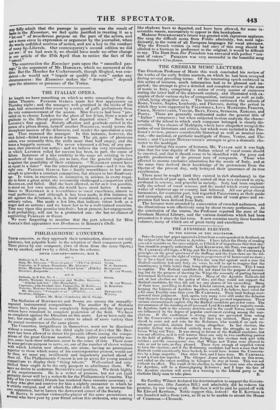THE AYRSHIRE ELECTION.
TO THE EDITOR OP THE SPECTATOR.
Sin—In your last paper appeared a letter from a correspondent in Scotland, on the subject of the late election in Ayrshire. I have taken the liberty of sending you is few remarks on the same subject, as I think it of importance that that elec- tion should be properly understood. Lord KELBDRNE, the Tory, was opposed by Mr. CAm rntt.L ofCragie, a Whig, and Mr. CRAIG, a Radical. Mr. CAMPBELL'S principles on the great questions of the Suffrage and the Corn-laws are the fol- lowing,—he will give the right of voting to proprietors of 6/. houses and no more ; lie is tbr a fixed duty on grain. When one sees that against such a man the Radical candidate had only forty-six votes, he will lie apt to imagine that the ColiMitueney is little better than being altogether Conservative. This I want to explain. The Radical candidate did not stand for the purpose of succeed- ing, but for the purpose of showing the Whigs the necessity of putting forward determined Reformers at every election. Many of the Ayrshire Radicals did not at last election see the policy of this; and they would not support the Radical candidate, for they did not see any chance of his succeeding. Many of them were unwilling to divide the Liberal interest, and, for the purpose of keeping the Liberals of Ayrshire together, would, I do believe, have voted for a far more Finality man than even Mr. CAMPBELL. Their local feelings over- powered their judgment. And, again, very many were still under the delusion that the mere keeping out a Tory was a thing of the greatest importance. These various circumstances explain why the Radical candidate got so few votes. The circumstance of his standing at all increased Lord KELE/HIRE'S majority much. In Ayrshire, both in the country districts and in the small Towns, many votes are influenced by the degree of popular excitement existing among the non- electors. If the excitement is strong, many arc prevented from voting for the Conservative candidate who feel that way inclined. Many are in- duced to come out and vote for the Reformer, who would, if no such ex- citement prevailed, abstain from voting altogether. In last election, the popular feeling was diverted entirely. away from the struggle, as one be- tween Whig and Tory. It was strong in favour of the Radical candidate, but was not effective, as it is well known there can only be two conflicting parties iu the field of politics. The popular keling in this election took part with neither ; and the consequence was, that V■ higs and Tories were allowed to vote, or not to vote, as they pleased. There were enough of unpolled voters to turn the election ; and if the Retbrming candidate had been a man that the Radicals could consistently have backed, lie would have beaten the Conserva- tive by a large majority. One other fact, and I have done. Mr. CAMPBELL is not a Corn-law repealer. The Glasgow Argus attacked him on this score, and called on the voters residing in Glasgow to stay at home. This was not without its effect. The result of the election is, that the next man who stands for Ayrshire, will be a thoroughgoing Reformer ; and I hope the fate of the Ayrshire election will serve as a warning to the Liberal party in the


























 Previous page
Previous page